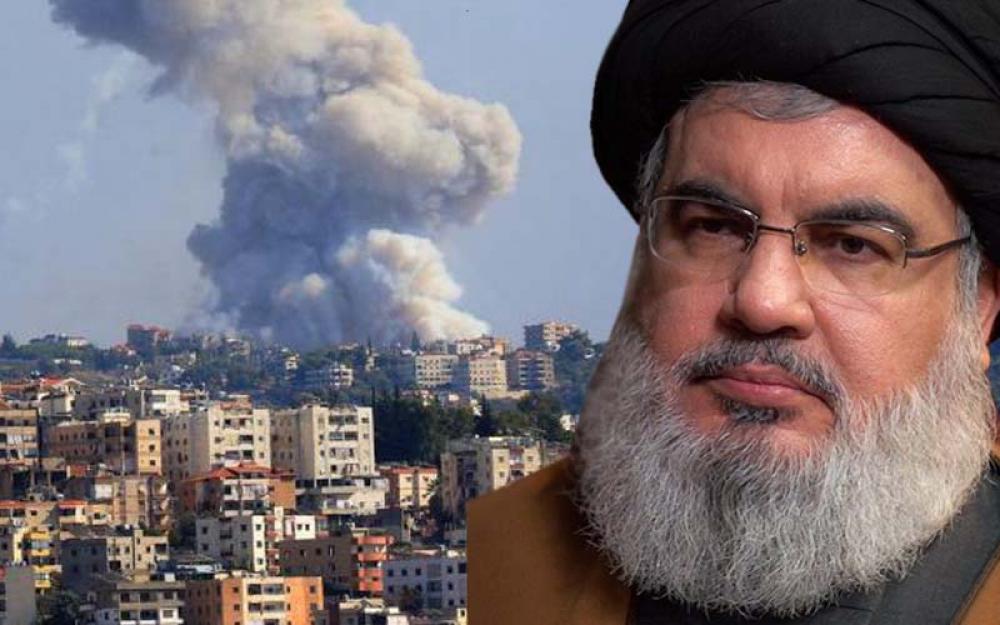Just Earth News | @justearthnews | 28 Sep 2024

The Israel military said 64-year-old Nasrallah is dead. Photo courtesy: Wikimedia Commons / UNICEF/Dar Al Mussawir
Hassan Nasrallah, the chief of Lebanese Shia Islamist political party and military-resistance organization Hezbollah, has been killed in a strike launched on Beirut by the Israeli military, the Israel Defense Forces (IDF) claimed on Saturday.
The Israel military said Nasrallah, 64, is dead though Iran-backed Hezbollah has not issued any statement yet.
Israel said on Saturday it had killed Hezbollah leader Sayyed Hassan Nasrallah in an airstrike in Beirut's southern suburbs a day earlier, in what would be a devastating blow to the group as it reels from an escalating campaign of Israeli attacks.
The Israel Defence Forces posted on X, "Hassan Nasrallah will no longer be able to terrorize the world."
Hassan Nasrallah is dead.
— LTC Nadav Shoshani (@LTC_Shoshani) September 28, 2024
The Israeli Air Force carried out targeted airstrikes in Beirut and the military claimed it hit the headquarters of the Hezbollah group.
Meanwhile, in another update shared on X, IDF said Hezbollah’s Missile Unit Commander Muhammad Ali Ismail and his deputy Hussein Ahmad Ismail were eliminated in IAF strike.
"Ali Ismail was responsible for directing numerous terrorist attacks against the State of Israel, including the firing of rockets toward Israeli territory and the launch of a surface-to-surface missile toward central Israel on Wednesday," IDF wrote on X.
"This follows the elimination of the terrorist Ibrahim Muhammad Qabisi, Head of Hezbollah's Missiles and Rockets Force, as well as other senior commanders of this unit," the army said.
Hassan Nasrallah will no longer be able to terrorize the world.
— Israel Defense Forces (@IDF) September 28, 2024
The conflict between IDF and Hezbollah has intensified in recent times.
According to media reports, the Israeli airstrikes on the terror group this week left over 700 people dead in Lebanon.
The sudden and massive escalation between Israel and the Hezbollah armed group in Lebanon has created widespread fear that even worse is to come, UN humanitarians said on Friday.
“We are witnessing the deadliest period in Lebanon in a generation and many expressed their fear that this is just the beginning,” said Imran Riza, the UN’s top aid official in Lebanon. “The UN and its partners are closely coordinating with the Lebanese government to support the response efforts. This includes aligning aid distribution, conducting joint assessments, and identifying urgent needs for affected populations.”
Speaking from Beirut, Riza, the UN Humanitarian Coordinator in Lebanon, said that for nearly a year, the country’s people – and especially those in the south – had “lived in fear” that the war in Gaza could come to them.
"Today across Lebanon, thousands of people in rural communities previously unaffected by Israeli targeting of Hezbollah infrastructure have fled bombardment and widespread destruction that have claimed at least 700 lives, injured thousands and uprooted around 120,000 people “within mere hours”, he said, adding: “We are running into people that are saying, ‘What’s the way to Tripoli? How do we get to there?’”
The UN aid coordinator’s comments come amid increasingly intense exchanges of fire across the UN-patrolled line of separation between Lebanon and Israel since 7 October when war erupted in the Gaza Strip. Last week’s extraordinary targeting of Hezbollah pagers and walkie-talkies left hundreds dead and signalled the start of intense Israeli bombardment in Lebanon and retaliatory strikes by Hezbollah.